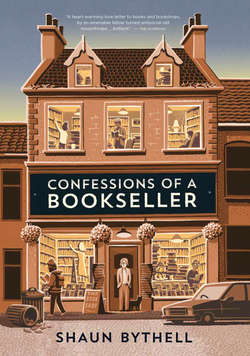Читать книгу Confessions of a Bookseller - Shaun Bythell - Страница 70
На сайте Литреса книга снята с продажи.
Thursday, 12 March
ОглавлениеOnline orders: 2
Orders found: 2
More torrential rain. The buckets in the window are slowly filling up.
A customer accosted me as I was tidying up the history section, and said, ‘I was in here two years ago and you had a book by Roger Penrose. Do you know what happened to it?’ There are 100,000 books in the shop, and we probably sell 20,000 books a year. Including rotated stock, books that customers dump on us and the books we’ve sold over the past fifteen years, I estimate that I must have handled close to a million books. I don’t remember Roger Penrose’s book.
Telephone call from Anna in the evening. She’s clearly missing Wigtown. We reminisced about the time we went to visit her grandmother in a retirement home in Baltimore and she insisted on taking us out for lunch. Many of the residents there still drove, but with increasingly failing memories and eyesight they often had trouble finding their cars in the home’s car park, so when one of them had the bright idea of attaching a plastic toy to the aerial of their car, the others all did the same. It remains one of the strangest sights I’ve seen: a car park in which every vehicle’s aerial was decorated with some sort of child’s toy.
Frieda (Bubeh), Anna’s maternal grandmother, never lost her Polish accent; even after sixty years in America, she still sounded as though she’d just stepped off the boat with her husband, Max. Both Jewish, they’d survived the war and the Nazi scourge against considerable odds. Bubeh, aged thirteen when the Nazis invaded her small town in rural Poland and rounded up the Jews, had escaped with her sister and spent most of the war on the run, dependent on the kindness of the best of humanity and exposed to the cruelty and vindictiveness of the worst. She ended the war in a work camp before being liberated.
Max, Anna’s grandfather, was transported to Auschwitz with his first wife and their two sons. He was separated from them on arrival. He never saw them again. Anna—although she is doubtless unaware of it—bears the legacy of it: sharp shards of sadness occasionally puncture her otherwise eternally optimistic disposition. I see it whenever I look at her, but I wonder if that’s just my own sadness for her family’s past manifesting itself. Primo Levi, who, along with Anna’s grandfather and a few other fortunate souls, survived the concentration camps, witnessed the unbelieving stares of the Soviet liberators who cut the wires of the camp on 27 January 1945. He wrote in The Drowned and the Saved: ‘Until 1944 there were no children in Auschwitz; they were all killed by gas on arrival. After this date, there began to arrive entire families of Poles arrested at random during the Warsaw insurrection: all of them were tattooed, including new-born babies.’ Max’s children were aged five and seven, just two of the million estimated to have been killed in Auschwitz.
My maternal grandparents, by contrast, spent the war in rural Ireland, a country so recently freed from the shackles of British dominion that it couldn’t even bring itself to recognise the conflict in Europe as a war, preferring instead to refer to it as ‘The Emergency.’ While hardly living in luxury, they were—at least—in no danger of being executed for who they were.
Till Total £155
10 Customers
